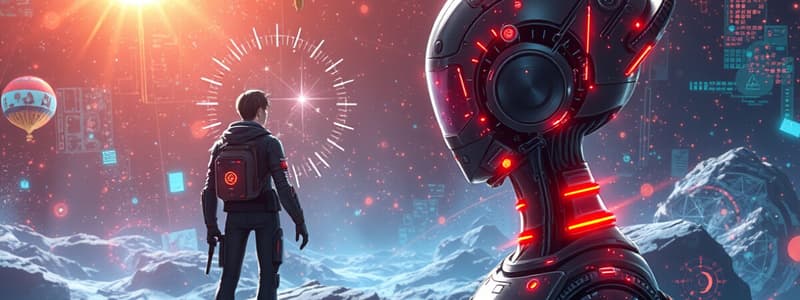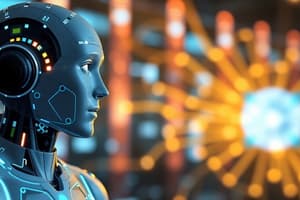Podcast
Questions and Answers
What is the main function of an agent?
What is the main function of an agent?
- To manipulate its environment for survival
- To perceive its environment and act upon it (correct)
- To make decisions based on past experiences
- To communicate with other agents
A software agent can only perceive inputs from hardware sensors.
A software agent can only perceive inputs from hardware sensors.
False (B)
What term is used to describe the complete history of everything an agent has perceived?
What term is used to describe the complete history of everything an agent has perceived?
percept sequence
An agent's behavior is mapped from a given percept sequence to an ________.
An agent's behavior is mapped from a given percept sequence to an ________.
Match the following components with their descriptions:
Match the following components with their descriptions:
What are the possible actions the vacuum agent can take?
What are the possible actions the vacuum agent can take?
A rational agent always performs actions that lead to desirable outcomes.
A rational agent always performs actions that lead to desirable outcomes.
What defines the performance of an agent?
What defines the performance of an agent?
If the current square is ____ , then the vacuum agent will suck.
If the current square is ____ , then the vacuum agent will suck.
Match the following terms related to rational agents:
Match the following terms related to rational agents:
Flashcards are hidden until you start studying
Study Notes
Agents and Environments
- An agent perceives its environment through sensors and acts upon it via actuators.
- Human agents utilize organs such as eyes and hands, while robotic agents use cameras and motors.
- A software agent receives inputs from keystrokes, file contents, and network packets.
Percepts and Agent Function
- A percept is the current sensory input to an agent.
- The percept sequence is the complete history of everything an agent has perceived.
- An agent’s action can depend on all past percepts but not on unperceived information.
- The agent function maps a given percept sequence to an action, while the agent program is the concrete implementation of this function.
Vacuum Cleaner Example
- The vacuum agent operates in a world with two locations: squares A and B.
- It perceives its location and dirt status and can choose to move, suck up dirt, or do nothing.
- The agent function determines the action based on the current conditions.
Rationality and Performance Measures
- A rational agent aims to perform the "right thing," evaluated through a performance measure.
- Performance defined through desirable outcomes of the agent's actions reflects its effectiveness.
- Measurement of performance is crucial, such as the amount of dirt cleaned during a shift.
Considerations for Rational Agents
- Rationality is influenced by:
- Performance measures defining success.
- The agent’s knowledge of its environment.
- Actions the agent can perform.
- The percept sequence it has observed.
Defining Rational Agents
- A rational agent selects actions expected to maximize performance given its percept sequence and knowledge.
- An omniscient agent knows the actual outcomes of actions, but true omniscience is unattainable.
Rationality vs. Perfection
- Rationality prioritizes maximizing expected performance, while perfection is about maximizing actual performance.
- Perfect actions may be unrealistic given unpredictable factors (e.g., accidents).
Information Gathering and Learning
- Agents gather information through exploration of the environment, especially if initially unknown.
- A rational agent learns from its experience, evolving from prior knowledge and adapting through experience.
Autonomy in Agents
- An agent's reliance on designer knowledge diminishes its autonomy.
- Rational agents should strive for autonomy, compensating for any incorrect prior knowledge.
- While complete autonomy isn't usually needed initially, agents enhance their independence through experience.
Studying That Suits You
Use AI to generate personalized quizzes and flashcards to suit your learning preferences.




